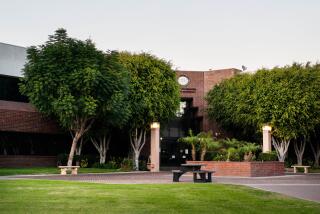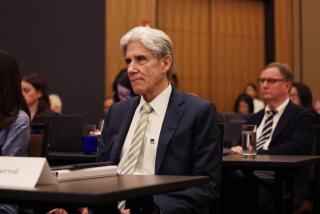* Dr. Charles Bechtol; UCLA Surgeon
- Share via
Dr. Charles O. Bechtol, 86, who headed orthopedic surgery at UCLA Medical Center. Educated at Stanford Medical School, Bechtol became internationally known for his research in biomechanics and orthopedic surgery and made major improvements in artificial limbs. Among the devices he designed were the Bechtol total hip system, the Bechtol fluted bone screw and the Bechtol continuous strength bone plate. In 1991, Bechtol received the Markowitz Award from the Academy of Surgical Research for a lifetime of outstanding contributions to medicine through experimental surgery. In 1970, the doctor founded the Los Angeles-based Joint Implant Surgery & Research Foundation, which he chaired until his death. Bechtol chaired the Yale Medical School Department of Surgery, where he established the Yale Biomechanics Laboratory, before joining the UCLA faculty in 1957. On July 16 in Pasadena.
Noel Behn; Author, Producer
Noel Behn, 70, a producer and author, many of whose books were turned into films. Behn’s first novel, “The Kremlin Letter,” based on his experience in Army counterintelligence, was released as a motion picture in 1970. “The Brink’s Job,” starring Peter Falk in 1978, was based on Behn’s nonfiction book “The Big Stick-Up at Brink’s” about a 1950 robbery. A film is in development based on his most recent book, “Lindbergh,” about the kidnapping of the pilot’s baby. The writer acted in some films directed by his friend Woody Allen, including “Another Woman” and “Stardust Memories.” A New Yorker who was a favorite host and raconteur at Elaine’s and the Russian Tea Room, Behn in the 1950s and 1960s helped create off-Broadway theater when he was producing director of the Cherry Lane Theater. In addition to his books, Behn wrote scripts for and served as creative consultant on the NBC television series “Homicide: Life on the Street.” On Monday in New York City of a heart attack.
Dr. Willard Goodwin; Urologist
Dr. Willard E. Goodwin, 82, a urologist who worked on inhibiting rejection of kidney transplants. A native of Los Angeles, Goodwin was educated at UC Berkeley and Johns Hopkins Medical School. He served in the Army during World War II, landing in France on D-Day. In 1951, Goodwin came back to Los Angeles as chairman of urology at UCLA. Four decades later, the doctor received the Ramon Guiteras Award from the American Urological Assn. for his lifetime achievement in urology. He was credited with more than 40 major discoveries or innovations, including use of prednisone to halt rejection of transplanted kidneys and techniques for diagnosing prostate cancer. Goodwin was president of 11 national and international organizations related to his work, including the American Board of Urology. Among his other awards was the Keyes Medal from the American Assn. of Genito-Urinary Surgeons and the St. Paul’s Medal from the British Assn. of Urologic Surgeons. On July 22 in Los Angeles.
Dr. Robert Pudenz; Neurosurgeon
Dr. Robert H. Pudenz, 86, a neurosurgeon who found way to treat water on the brain. Born in Cincinnati, Pudenz graduated from the University of Dayton and earned his medical degree at Duke University. After serving in the Navy Medical Corps and at its research institute in Bethesda, Md., Pudenz established his private practice in Pasadena and joined the staff of Huntington Memorial Hospital. He also taught neurological surgery at USC and was a director of the Huntington Medical Research Institutes. In the 1950s, Pudenz developed a cerebrospinal fluid shunt to treat hydrocephalus, or water on the brain. The shunt devices are produced by the company he co-founded, Medtronic Neuro in Goleta, and Heyer-Schulte Corp. in Santa Barbara where Pudenz was medical director. They are used with 100,000 patients a year. On Wednesday in Pasadena.






